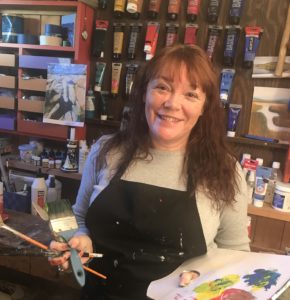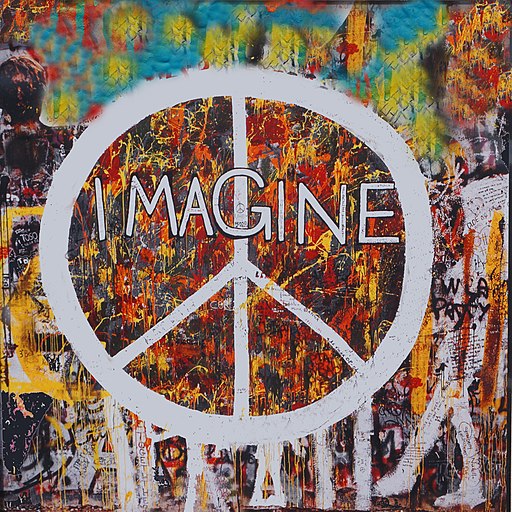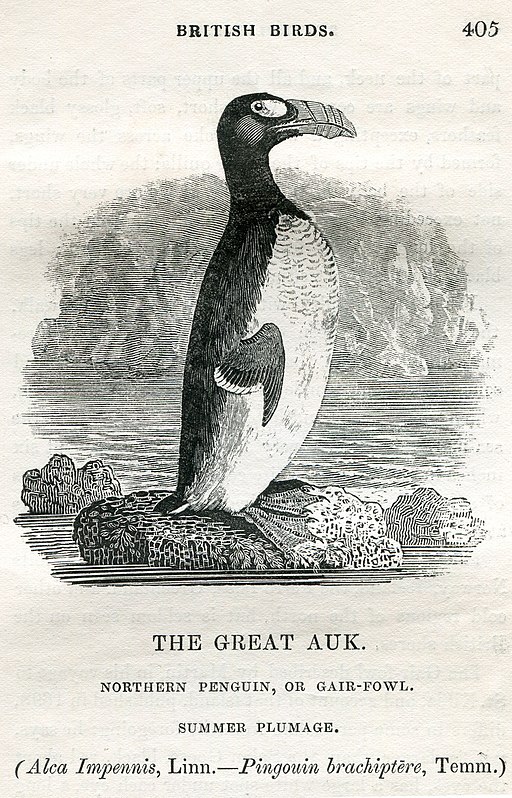Q & A with Michelle Myrick-Olsen
August 2018
 Michelle Myrick-Olsen was born and raised at Cape Pine Lighthouse in St Shott’s. A self-taught musician and visual artist, Michelle has visited over 40 countries, living and working in Saudi Arabia, Abu Dhabi, South Korea, India, and now Norway. These cultural influences have informed her song-writing as well as her paintings, which can be found in collections in Norway, UK, Abu Dhabi, Qatar, India, USA, and Canada.
Michelle Myrick-Olsen was born and raised at Cape Pine Lighthouse in St Shott’s. A self-taught musician and visual artist, Michelle has visited over 40 countries, living and working in Saudi Arabia, Abu Dhabi, South Korea, India, and now Norway. These cultural influences have informed her song-writing as well as her paintings, which can be found in collections in Norway, UK, Abu Dhabi, Qatar, India, USA, and Canada.
Michelle debuts her first solo show, The Song Series, mid-August, with seven performances in Canada, moving in early fall to Norway, and early winter to the Middle East.
NQ spoke with her via email, and the interview has been edited for space.
What was it like to grow up in a lighthouse? What’s an early memory of living there?
Growing up at Cape Pine felt no different than anywhere else I suppose. It was home. It was only when I reached school age that I realized we lived a little differently than everyone else. As children we mostly played outdoors, weather permitting, and under close observation so we wouldn’t run on the cliffs.
My father was a guitar player and singer so there was always music in our house, and many times when visitors came to the Cape, the guitar would come out no matter what time of day or night. As kids we were always allowed to get up if we woke up. One of my sweetest memories is waking one night when I was about 5 or 6 to hear some old men from St Shotts singing accapella songs in the kitchen. I remember feeling so thrilled that I had woken and would not miss it. For the next hour or so, I was in my glee bouncing on Mr Stan’s knee while Johnny Christopher, my Dad, and others sang songs. That’s almost 50 years ago and those men are all passed now including my Dad, but that memory still gives me a warm feeling of love and acceptance. It’s probably one of the reasons I became a musician myself.
Looks like you like to travel – what was the first trip you took by yourself? What was the first country you lived in for an extended period of time? What would be your #1 travel tip?
The first trip I took by myself was in 1986 to London, England, on a Student Work Abroad Program (SWAP) through MUN. I was 20 and worked in London for three months, and saved enough money to travel a week each in France, Spain, Portugal, and Ireland before returning to complete my Bachelor of Education. That summer truly changed my life. I was fascinated by cultural differences and similarities.
The first country I lived in was Saudi Arabia. In 2009 I took a teaching position there at an all-female public university. While I had traveled extensively by this time to over 20 countries, going to Saudi was like going to another planet. I had never seen anything like it either visually or culturally. It was a lot to take in, and in sweltering September heat (40+ Celsius) when I arrived. I could write a book about my three years in Riyadh, but suffice to say that living there taught me so much about humanity. The way people from different cultures perceive each other, before they know each other, is usually not very accurate. There exists a dichotomy in Saudi between how life looks and how life actually is. I became very aware of the power, strength, and conviction of belief. Just as equally I became aware of the ‘forbidden’ world where one could access whatever they wanted the same as one could in the western world. So many things are not as you would think. Women are not necessarily oppressed – it is the LGBT community that is truly oppressed. Women in fact have many privileges that the western world are not aware of.
This brings me to my #1 travel tip: No matter where you go in the world, you must go with an open mind and an open heart. Do not let pre-conceived notions of a place or culture tarnish your experience there. I’m not saying be naive and blindly trust everything and everyone, but rather become uber-conscious and aware of your surroundings. There are good and bad people everywhere. Trust your instincts, and always stay open to the possibility of extraordinary experiences because they can happen anywhere and anytime completely out of the blue.
What brought you to Norway? Is it like Newfoundland at all, or completely different? Do you speak the language? Is it hard to learn? What’s your favourite dish in Norwegian cuisine?
My husband is Norwegian so I guess you could say that LOVE brought me to Norway 🙂
Norway is so very much like Newfoundland! The landscape and seascape are almost identical in places. We live in Tønsberg area which is in southern Norway about an hour drive south of Oslo. It is very scenic, much like Newfoundland, with water on the doorstep or close by. In fact just here off the coastline are hundreds of small islands similar to Placentia Bay, minus the fog! As a result, this area is very popular for summer cottages and sailing because it also boasts some of the best summer weather and temps in the country. Culturally speaking we are also very similar with regards to food customs, family traditions, and cultural celebrations. The one major difference of course is the language.
Norwegian is difficult to learn especially for someone 50+ who has never learned a foreign language before. I studied Norwegian for four days a week over a 10-month period and I still can’t speak it. I can understand it a bit more, but I think it will take me a lifetime of living here to ever conduct a full conversation. I’m lucky in that most everyone, except the very young and the very old, can understand and speak English. Knowing the language is necessary though because product labels, road signs, government documents and such are only in Norwegian. This is the one major difference compared to other foreign countries where I have lived. Other places usually have an English translation included on most things.
Norwegian food is very much like Newfoundland food, a lot of fish and wild meat. Reindeer is popular here. Most dishes are also served with some form of root vegetable, just like at home. Northern cuisines are quite similar in how they preserve foods as well. However, the art of bottling seems to only be used here for jams and jellies whereas at home we bottle everything.
How long has it been now since you lived in Newfoundland? What does Newfoundland mean to you?
From the late 1990s to 2009, I had worked in the charitable sector with the most recent positions as CEO of Nature’s Legacy, and Executive Director of VOCM Cares Foundation before that. By 2009, I had come to a point in my life where I knew I wanted a change in career, and I wanted to travel, so I returned to my original profession as a teacher. I had a friend who was heading off to teach in Saudi and she encouraged me to submit an application. Two months later I was in Riyadh and my life was about to change forever.
I set out on an experimental adventure in September 2009, and gave myself a three-month window to decide if this was something that I wanted to continue, or if I would return to Newfoundland. Obviously my decision was the latter. Since that time, I have also lived in South Korea, United Arab Emirates, India, and now Norway.
All of these places have enriched my life in so many ways, but home will always be home. I had a colleague ask me one time in South Korea about this sense of home that I so proudly express. She was also Canadian, but could not identify with the same depth of feeling for any place she had ever lived in Canada. I explained it to her like this: if everyone I knew and loved were gone in Newfoundland, it would still feel like home to me. It is more than family and friends. It is the rocks, the sea, the barrens, the smells, the tastes, the laughter, the hardships – all of it and more. It is part of what makes us who we are. It is part of me. I believe that we carry this inside us no different than we carry our DNA. We take that out into the world as part of who we are as a person. No matter where I go and no matter what I do, I will always carry Newfoundland in my heart, and hope to represent her well in the world.
*********
The Song Series dates include:
– Saturday, August 18th at Community Centre, Long Harbour – Mount Arlington (8:00-11:00pm)
– Saturday, August 25th at Leaside Manor, St John’s (8:00-11:00pm)
– Tuesday, August 28th at the Edge of the Avalon Inn, Trepassey (8:00-11:00pm)
– Friday, Sept 7th at Arts & Culture Centre Arts Gallery, St John’s (7:00-10:00pm)
– Saturday, Sept 8th at Arts & Culture Centre Arts Gallery , St John’s (2:00-5:00pm)
In addition to public shows, there are also limited tickets are available for two private House Concert performances in St John’s on Friday, August 24th and Thursday, September 6th.
While you’re here:
… we hope you enjoy our website! Our online audience is growing every month, and that means that more people like you are seeing and reading incredible new work by Newfoundland and Labrador writers and artists. We want the people of the province to have access to high quality, contemporary writing about the unique and ever-evolving culture of this place, so we’re offering our online content for free. That said, if you’re able to help us keep providing this opportunity to both readers and creators in Newfoundland and Labrador, we encourage you to subscribe to our print magazine. Subscription details are here. If you ‘d like to support us with a donation or legacy gift (tax receipts available,) please contact us at rcohoe@mun.ca.



